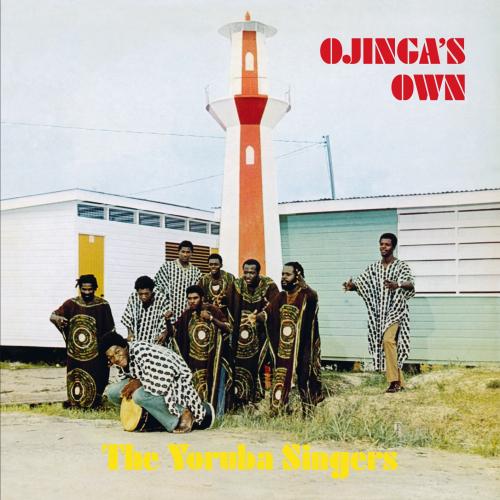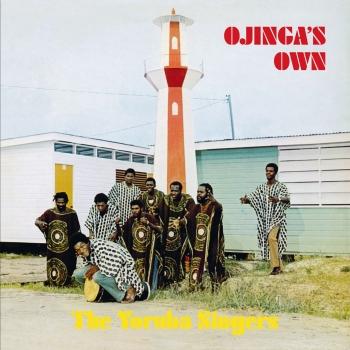
Ojinga's Own (Remastered) Yoruba Singers
Album info
Album-Release:
2023
HRA-Release:
14.07.2023
Album including Album cover
- 1 Ojinga's Own 04:39
- 2 What To Do 02:08
- 3 Stay Away 02:30
- 4 G.o.-Go 02:24
- 5 Uncomprehensidensible Radio-Matic Woman 04:10
- 6 Neighbour Jean 02:20
- 7 Massacura Man 03:39
- 8 Woman A Dead Ya Fuh Man 02:47
- 9 Ka Duma 03:53
- 10 I've Got To Be Somebody 03:36
- 11 No Intention 04:23
- 12 Basa Bongo 03:19
- 13 Black Pepper 03:02
Info for Ojinga's Own (Remastered)
The 1974 debut album Ojinga’s Own and single Basa Bongo/Black Pepper by Guyanese Afro-Folk band The Yoruba Singers has been remastered for vinyl and digital.
The Yoruba Singers formed in Georgetown, Guyana in 1971. Despite their name they were not from Nigeria, but identified strongly with the area from which so many of the African diaspora in Guyana and neighbouring regions were originally descended.
The group started adapting Guyanese traditional folk music as well as writing their own - blending a mixture of protest, social commentary, blues, and genres inspired by the times. Beginning with 12 people sharing vocal duties, most of the early repertoire was inspired by folk songs that started life on plantations or in religious settings accompanied by a few sparse musical instruments.
Integral to the Yoruba Singers’ sound are echoes of Obeah traditions which are very closely related to the Santería religion of Cuba and the Orisha and Shango traditions of Trinidad and Tobago. Calypso and steel-band culture from nearby Trinidad and Tobago was to some extent part of the musical DNA of the group, but they were naturally also influenced by the massive volume of rocksteady and roots-reggae coming from Jamaica.
Yoruba Singers
Digitally remastered
Yoruba Singers
Many years ago, the Africans arrived in the Guianas in chains. The Akan people from the region today known as Ghana were the very first, setting shackled feet upon the South American colony in 1621. More would follow over the next two hundred years, plucked from the nations of Western and Central Africa: the Kongo, the Abuna, the Yagba, the Igbo, the Fula, the Effa. Also the Aku, Egba, Ondo and Ijesa, clans who would be collectively referred to as the Yoruba.
In the intervening centuries, the Yoruba have become noteworthy as one of the few African cultures to survive the cultural erasure of chattel slavery and colonialism virtually intact, putting down new roots in the New World. The Yoruba culture, language and religion have traveled from their source in present-day Nigeria and Republic of Benin to become Santeria in Cuba, Puerto Rico and Dominican Republic; Candomble in Brazil, Argentina and Uruguay; Trinidad Orisha in Trinidad and Tobago; and specialized cults for Yoruba gods like Shango in Guyana.
In 1971, a musical collective formed in the Kitty area of Georgetown, Guyana, bearing the name of this proud African tribe. The members dubbed themselves the Yoruba Folk Group, but they would in time come to be known simply as the Yoruba Singers.
“We were given the name by a spiritualist named Bertie Greene,” says Eze Rockcliffe, one of the group’s founders and its longest-serving member. “At the time, we were moving around performing in different places, so he said we traveling like the Yoruba tribe.”
The emergence of the Yoruba Singers came at a time of crucial change in Guyanan society. The colony once known as British Guiana had achieved independence from the United Kingdom in 1966 and became a full republic in 1970. The new Co-operative Republic of Guyana had, however, inherited the British established racial hierarchy that privileged Guyanans of East Indian extraction over those of African descent, and this led to significant social discord in the aftermath of independence. In the mid-sixties, a grassroots organization called the African Society for Racial Equality (ASRE) had campaigned for the partitioning of British Guiana as the solution to the racial strife: one precinct for Africans, one for East Indians, and one for a voluntarily mixed population. When this proposition failed to gain political traction, ASRE co-founder Eusi Kwayana created a new group called ASCRIA—the African Society for Cultural Relations with Independent Africa. The new group dedicated itself to bolstering Afro-Guyanese identity and pride, showcasing the African cultural presence in Guyana, and building a cultural bridge between African descendants in Guyana and black people around the world. ASCRIA immediately took to recruiting black Guyanese youth and enrolling them in their African studies program. One of these youths was named Patrick Rockcliffe, who would take on the name Eze, an Igbo word meaning “king.”
This album contains no booklet.











